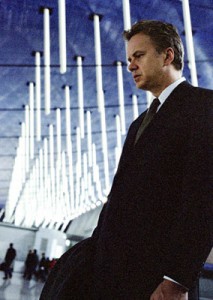The Anti-Auteur, Michael Winterbottom
 As versatile as Steven Soderbergh and just as willing to take chances, if not more so, Michael Winterbottom has made some of the worst movies of their era (The Claim, Wonderland), and some of the most interesting and entertaining as well (24 Hour Party People, Welcome To Sarajevo). Since 1995, he has made 17 feature films, intimate domestic dramas (Go Now, Wonderland), science fiction (Code 46), neo noir thriller (I Want You), costume period piece (Jude), stark and downbeat western (The Claim), musical biography/comedy (24 Hour Party People), you-are-there-politcial drama/documentary (Welcome to Sarajevo, In this World), lesbian serial killer character piece (Butterfly Kiss), concert porn (9 Songs), satirical meta-book adaptation (Tristram Shandy), journalist biopic weepie (A Mighty Heart) etc. What they all have in common is his emphasis on improvisation, he works like Mike Leigh without the focus on the fallout of Thatcher era policies on the British family. But unlike a lot of the directors who are guns for hire with no particular themes, motifs, or styles in mind when making movies, a lot of Winterbottom’s films often feel off the cuff and he’s constantly trying new things, as opposed to a hack who just wants to finish the movie on time and under budget.
As versatile as Steven Soderbergh and just as willing to take chances, if not more so, Michael Winterbottom has made some of the worst movies of their era (The Claim, Wonderland), and some of the most interesting and entertaining as well (24 Hour Party People, Welcome To Sarajevo). Since 1995, he has made 17 feature films, intimate domestic dramas (Go Now, Wonderland), science fiction (Code 46), neo noir thriller (I Want You), costume period piece (Jude), stark and downbeat western (The Claim), musical biography/comedy (24 Hour Party People), you-are-there-politcial drama/documentary (Welcome to Sarajevo, In this World), lesbian serial killer character piece (Butterfly Kiss), concert porn (9 Songs), satirical meta-book adaptation (Tristram Shandy), journalist biopic weepie (A Mighty Heart) etc. What they all have in common is his emphasis on improvisation, he works like Mike Leigh without the focus on the fallout of Thatcher era policies on the British family. But unlike a lot of the directors who are guns for hire with no particular themes, motifs, or styles in mind when making movies, a lot of Winterbottom’s films often feel off the cuff and he’s constantly trying new things, as opposed to a hack who just wants to finish the movie on time and under budget.
 Code 46 has Tim Robbins as an insurance/fraud investigator and Samantha Morton as the woman who he’s investigating who he falls in love with. It’s a Blade Runner/Gattaca style sci-fi with a lot of coded language, a heavy focus on the importance of being accepted within the overly muted society which will nevertheless allow privelege, and a mystery and moral drama at its center. Winterbottom takes tremendous chances, one after the other, the characters speak in a mix of English, French and Spanish, (most of the casual, yet important language, is in Spanish), there are only a few futuristic devices and he relies on the “otherness” look of various deserts and Asian countries (where most of the film takes place, much like Blade Runner) to give the film a just far enough into the future feel, and the two leads have absolutely no chemistry whatsoever, and it appears to be on purpose so it can pay off later. The score, by Free Association (who work with David Holmes who scored a lot of the recent Bond films, as well as Ocean’s Eleven and Out of Sight), is ambient and terrific, as is the stunning and rich photography, which manages to avoid the antiseptic look of sci-fi movies about the supression of natural emotion. If there was one thing that didn’t work, it’s the use of voiceover, as Morton narrates a lot of the film and fills us in, and sometimes analyzes a situation. But rather than the usual reason for voiceover, filling in the audience on backstory, plot points, and character motivation, this is more regretful, morose, dreamy, and almost a questioning of the movie in front of us.
Code 46 has Tim Robbins as an insurance/fraud investigator and Samantha Morton as the woman who he’s investigating who he falls in love with. It’s a Blade Runner/Gattaca style sci-fi with a lot of coded language, a heavy focus on the importance of being accepted within the overly muted society which will nevertheless allow privelege, and a mystery and moral drama at its center. Winterbottom takes tremendous chances, one after the other, the characters speak in a mix of English, French and Spanish, (most of the casual, yet important language, is in Spanish), there are only a few futuristic devices and he relies on the “otherness” look of various deserts and Asian countries (where most of the film takes place, much like Blade Runner) to give the film a just far enough into the future feel, and the two leads have absolutely no chemistry whatsoever, and it appears to be on purpose so it can pay off later. The score, by Free Association (who work with David Holmes who scored a lot of the recent Bond films, as well as Ocean’s Eleven and Out of Sight), is ambient and terrific, as is the stunning and rich photography, which manages to avoid the antiseptic look of sci-fi movies about the supression of natural emotion. If there was one thing that didn’t work, it’s the use of voiceover, as Morton narrates a lot of the film and fills us in, and sometimes analyzes a situation. But rather than the usual reason for voiceover, filling in the audience on backstory, plot points, and character motivation, this is more regretful, morose, dreamy, and almost a questioning of the movie in front of us.
And then there’s the dialogue:
SM: “You have a son or daughter?”
TR: “Son.”
SM: “I bet he’s special.”
TR: “He is special.”
SM: “Everybody’s children are special. It makes you wonder where all the ordinary adults come from.”



